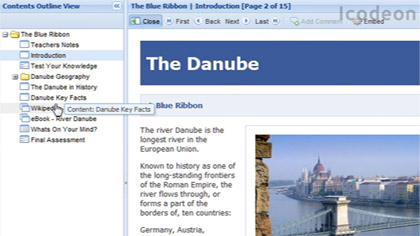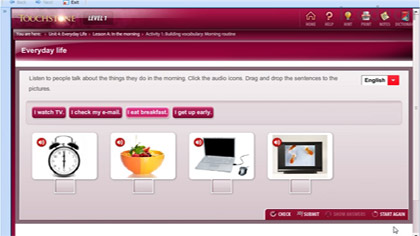ASPECT Newsletter 1
|
|
| Issue 1 – December 2009 |
|
|
|
|
|
|
BETT Show 2010: London on 13 January 2010, 14.00-16.00.
The ASPECT Best Practice Network is organising a workshop during the BETT Show in London on 13 January 2010 to explore the benefits of learning technology standards for discovering, creating, packaging, sharing and using educational content.
If you are a publisher, an educational tools' provider or learning professional creating your own resources, this workshop will provide you with an understanding of some of the key technology standards that will facilitate and improve the impact of your work.
Participation is free of charge but you need to register in order to reserve a place at the workshop that will be held at the Hilton hotel next to the Olympia exhibition hall. In order to receive an invitation and view the programme, please register at http://www.learningstandards.eu/bett
|
|
|
| ASPECT tools and services update |
|
The aim in the ASPECT project is to produce best practices for digital educational content discovery and use.
After the first year of the project, we already have a number of tools and services to demonstrate some emerging best practices and to support developers and other stakeholders that want to explore how to effectively implement content standards and specifications.
SCORM and Common Cartridge?
Visit the ASPECT web site to find out more about content packaging. We have an IMS Common Cartridge and SCORM Demonstrator to help you to build and utilize learning content packages - from the creation of packages through testing their conformance to working with the content http://www.aspect-project.org/node/40
Even if you do not have a technical background, or are more interested in pedagogy, check out the differences between SCORM and Common Cartridge. Two ASPECT videos demonstrate how SCORM is particularly well adapted to self-paced, training or learning situations where a single learner works independently with no intervention from an instructor. The more recent Common Cartridge specification, however, lends itself more to blended learning situations where traditional teaching is combined with web-based e-learning.
Introducing IMS Common Cartridge
This short, five-minute video explains the main features of the Common Cartridge standard and how it is particularly suited to ‘blended learning’ situations.

Advanced SCORM 2004
This companion video to "Introducing IMS Common Cartridge" explains the main features of SCORM technology and how this standard is particularly suited to self-paced training.

ASPECT Metadata
As a result of ASPECT’s work, learning objects will produced in different formats for testing in school pilots in four countries later in 2010. However, having the same learning resource can be problematic if one wants to use existing metadata specifications such as IEEE Learning Object metadata (LOM) or Dublin Core (DC).
This issue is one of the things addressed by the new ASPECT metadata application profile that is currently being used to support European Schoolnet’s Learning Resource Exchange service for schools. The LRE Metadata Application Profile version 4.0 (LREMAP4 http://fire.eun.org/LREMAPv4p0.pdf) makes it easier to describe learning objects in different formats. LREMAP4 is based on the combination of two specifications: IEEE LOM and the Information for Learning Object eXchange (ILOX) specification, which is currently developed by the IMS Learning Object Discovery & Exchange (LODE) group in collaboration with ASPECT.
One kind of customization of LOM introduced by the LREMAP4 relates to the use of controlled vocabularies tailored to the needs of the schools’ sector in Europe. In order to adequately manage these vocabularies, ASPECT has developed a Vocabulary Bank for Education (VBE) http://aspect.vocman.com/vbe/home. This bank is used to store controlled vocabularies, their translations and crosswalks between them. In the VBE, each vocabulary and vocabulary term is uniquely identified. Using the VBE term and vocabulary identifiers as the LREMAP4 neutral language makes it easier to deal with multilingualism issues: identifiers are stored in metadata and requested translations can be looked up in the VBE.
|
|
|
|
|
|
If you are interested in content standards then also check out the Learning Technology Standards Observatory. With support from the ASPECT project, its web site has recently had a major redesign. The LTSO provides key information on all the key standards in this area along with a new feature that allows you to register as an LTSO expert
http://www.cen-ltso.net
|
|
|
| ASPECT workshops and plugfests in 2010 |
|
 If you are unable to come to the ASPECT workshop at BETT in London on 13-16 January 2010, we will be running a series of workshops and plugfests throughout the year. At these events, you can not only learn more about content standards and specifications but also have opportunities to use ASPECT tools in hands-on sessions and explore how you can benefit from the best practices developed in the project. If you are unable to come to the ASPECT workshop at BETT in London on 13-16 January 2010, we will be running a series of workshops and plugfests throughout the year. At these events, you can not only learn more about content standards and specifications but also have opportunities to use ASPECT tools in hands-on sessions and explore how you can benefit from the best practices developed in the project.
Forthcoming events in 2010 will include an introduction to an ASPECT Application Profile Registry which is currently being developed.
Register on the ASPECT web site in order to be kept up to date on new ASPECT events http://aspect.eun.org/node/10
Or, better still, register as an ASPECT Associate Partner (free of charge) and your booking will be given priority for any ASPECT events that are oversubscribed.
|
|
|
|
The ASPECT project is coordinated by European Schoolnet with support from the European Commission's eContentplus Programme
http://www.aspect-project.org
|
|
Print version
|
